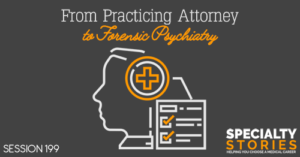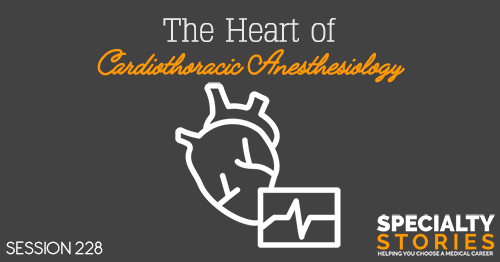Apple Podcasts | Google Podcasts
Session 199
Dr. Ashley VanDercar was a practicing attorney, so why did she decide to switch careers and then choose to pursue forensic psychiatry? If forensic psychiatry is something you’re interested in, check out the American Academy of Psychiatry in the Law (AAPL).
For more podcast resources to help you with your medical school journey and beyond, check out Meded Media.
Listen to this podcast episode with the player above, or keep reading for the highlights and takeaway points.
[01:13] Interest in Forensic Psychiatry
Ashley first became interested in psychiatry in her third year of medical school. When she did her main psychiatry rotation, she went in thinking it wasn’t something she was going to do. Her head was wrapped around wanting to be a policymaker. Before going into medical school, she was a practicing attorney. But when she did the psychiatry rotation, she fell in love with the field as well as the patient interaction.
That being said, she really wasn’t sure she was going to do it until she met a forensic psychiatrist on that rotation. She learned about the field of forensic psychiatry, which she didn’t know existed. She also learned that she could take and leverage both of her degrees and do what she loved.
So she ultimately decided, during that one rotation, that she wanted to go into forensic psychiatry. From there on, she crafted her electives and her match list based on that.
[04:29] Seeing Medicine From a Lawyer’s Perspective
Especially during fellowship, Ashley has seen the impact of policies on the patients she treats in prisons or state forensic hospitals. And it can be frustrating.
'It can be frustrating to see policies that might look one way on paper, but then look different once they've been implemented and the effect that they can have on patients.'Click To Tweet[05:58] The Biggest Myths or Misconceptions About Forensic Psychiatry
Ashley says that a lot of people don’t know about it as a specialty, especially when they’re in medical school. In Miami, she was lucky to learn about it, just because the forensic psychiatrist happened to be the attending physician one day in the outpatient clinic. Ashley ended up sitting next to her and she staffed her patients.
Similarly, in Cleveland, the forensic psychiatry program is very integrated with the medical school so the medical students are familiar with the field. But at some schools, medical students don’t really know forensic psychiatry as a field.
'There is this awesome niche within psychiatry that people can choose to pursue that's totally different than your typical clinical psychiatry.'Click To TweetAs a forensic psychiatrist, there are many different types of tasks you can have. You can be an evaluator in civil or criminal cases. You can be there for the court, as a neutral third party, or hired by either side’s attorney.
Either way, you’re literally sitting there forming and sharing opinions on psychiatric issues for a legal proceeding. It’s very academic, and that’s a side of medicine most people don’t know about. There’s also the treatment role, such as treating patients who have been found incompetent to stand trial, or not guilty by reason of insanity.
[07:42] What is Forensic Psychiatry?
Forensic psychiatry is psychiatry at the intersection of law and medicine. There’s a lot of different ways that people can practice forensic psychiatry. In addition to the evaluator roles, there are treatment roles, which can be inpatient or outpatient.
Outpatient Treatment
For instance, during residency and fellowship, Ashley spent part of her time at an outpatient psychiatric clinic doing medication management for people who were in the criminal justice system. They had been released from jail or prison and were on a mental health court docket (probation, parole, or some sort of diversionary docket. This is one treatment aspect.
“Forensic psychiatry is psychiatry at the intersection of law and medicine”Click To TweetInpatient Treatment
There’s also inpatient treatment, where you might be treating people in the jail, in the prison, or at a forensic hospital. At the forensic hospital, one type of treatment is restoration of their competence to stand trial.
Competence to stand trial is a concept where an individual’s mental health might make it so that they can’t understand the nature and the objectives of the criminal proceedings.
And because of that, the proceedings are paused, and they’re sent to an inpatient forensic hospital where some forensic psychiatrists provide treatment there.
Evaluation Role
Forensic psychiatrists can be evaluations in a court clinic or on private retainer by an attorney. There are criminal evaluations and civil evaluations. Criminal ones include determining if someone is competent to stand trial, or if they meet criteria for a “not guilty by reason of insanity” verdict. Civil evaluations include malpractice, psychiatric damages, and a whole litany of other cases.
For example, fitness for duty is one of the types of civil cases that forensic psychiatrists do. You can do a fitness for duty evaluation for a police officer, for a pilot, for a teacher, for a physician, for a medical student.
[11:12] One Typical Day
In fellowship, Ashley describes every day as having been different. Every day of the week had a different layout. They had a different schedule at a different location, which she loved.
Now, as she is preparing to start her first job as an attending, she’s not yet clear what her day-to-day schedule will look like, but it will have variety.
In fellowships, a typical day could start at her day at the state hospital doing consults. These are not the typical consults as you would imagine for other specialties. Rather, they were often consults to assess whether someone had been “restored” to competence, based on their treatment by the treating psychiatrist.
For example, imagine an individual with severe schizophrenia had a delusion that the prosecutor and the judge were working together for the Illuminati. They were evaluated, found incompetent to stand trial, and now they’ve been medicated and treated for six months.
The treating psychiatrist thinks that the medication has allowed them to push their delusion down enough to understand that the prosecutor is not working with the judge, and that there is not a conspiracy.
So the treating psychiatrist would request a consult from someone who is impartial. The consult then involves a one to two-hour evaluation, going through the typical psychiatric questions, and a bunch of questions specific to the criminal trial proceedings.
Once done, they would come up with a conclusion about their opinion and spend an hour dictating their report. Dictation was definitely something that had a sharp learning curve, which Ashley had ultimately came to love. After she finished her dictation, she would spend the rest of the morning revising and editing the report from the prior week (or supervising it with an attending), and then turn it in.
In the afternoon, Ashley, on some days, would then go to her community site. She would usually see about six patients, often ones on a mental health probation docket, who were living in the community. Her role was to provide medication management to help them maintain their stability and remain in the community.
[14:45] Another Typical Day
Another typical day would be going to the court clinic in the morning. There, she would do evaluations of people who were in the jail to determine, as the impartial evaluator, whether they were competent to stand trial. If so, she sometimes was then asked to evaluate whether they met criteria for a “not guilty by reason of insanity” verdict.
Not Guilty by Reason of Insanity is when someone was so mentally ill at the time of the offense that they were unable to understand that what they were doing was wrong. She would do the requested evaluation, usually taking about two hours, dictate it, and also edit the one from the week before (which had already been supervised by an attending).
Then in the afternoon, she would often do private cases at a different location, on cases involving topics such as fitness for duty or psychiatric malpractice.
[15:58] How Her Law Background Helped Her Through Fellowship
One of the hardest parts for Ashley was having this crisis of wondering who she was to offer these types of opinions. They aren’t clear-cut decisions. But according to the law, when you offer an opinion, you just have to be reasonably medical, medically certain, which is technically 51%. Still, it was really hard initially, to be the person offering these opinions.
Part of fellowship was coming to grips with being able to well reason out her opinion and support it. Fellows are repeatedly cross-examined throughout fellowship. They have mock trials on a repeated basis. And this has helped her become more comfortable in offering opinions.
Part of that is also recognizing that she’s not the ultimate decision maker. She’s just explaining how she views the case, and why she views it that way. And she’s just putting it forth to the trier of fact, which is the judge or the jury.
Ashley says that being a lawyer has given her a different viewpoint especially early on during fellowship. Most people start fellowship without a law background. They have to, at the start, learn how to read cases, how to testify, and how to understand case law and the law. So having that knowledge under her belt proved to be useful.
[19:28] Taking Calls
Ashley has no nights, no weekends, and no calls. She also did not have calls during fellowship as well.
Some people have calls as part of their forensic work. For instance, if you are doing one day a week at a jail, you might have calls about people that have come in whose medications weren’t started or who need seclusion orders, or are having other issues. Correctional psychiatry is a branch of forensic psychiatry.
The other type of call, not applicable to her in her new job, is that even if you’re a forensic psychiatrist, part of your week will often be regular psychiatry. Most people that practice forensic psychiatry do a varying amount of regular psychiatry, in addition to their correctional or forensic psychiatry type of work. They would thus be in the typical call pool, where they’re taking calls for inpatient units based on their appointment to an academic institution being in psychiatry.
[21:13] Matching Process for the Fellowship
'Forensic psychiatry is not in the match.'Click To TweetBasically you apply for Forensic Psychiatry outside of the match. The competitiveness is going to vary depending on the year as well as the institution. Some programs are very competitive. And it’s important for those particular programs, you already have a good idea that you’re going to do forensic psychiatry from early on in residency so you can start getting involved and publishing.
To do this, you can get involved early on in the American Academy of Psychiatry in the Law (AAPL), the parent organization for forensic psychiatry. It’s an institution that provides a great deal of mentoring yearly conferences, journals, and opportunities for publishing.
“Publications and presentations are going to be important when you apply in order to get into the competitive programs.”Click To Tweet[22:34] Message to Primary Care Doctors
Ashley explains that in her community clinic, a lot of patients were mandated to come see her or someone in her office. They’re not mandated to go see primary care. So the vast majority of the patients who came in to see her did not have primary care doctors. Because of that, it would often be up to her to point out to them what and why it needs to be done.
So there was more interaction that you might expect because of it being a mandated treatment setting. And most of them were not having regular primary care treatment. And so, she filled in that gap of explaining the importance of managing their sugars and their hypertension, and being on their HIV medications or whatever the deficit might be.
That being said, what she wishes primary care doctors know is that there’s a lot of stigma associated with mental health.
'There's a lot of stigma associated with mental health. There's even more stigma associated with the combination of mental health and being someone who is a felon.'Click To TweetAshley writes very detailed notes. For instance, her notes have to mention that her patient has schizophrenia, and was just recently released from a 15-year prison sentence for murder, on parole. Those details often get read by the primary care or other specialties.
But this worries her sometimes, as to whether her information might taint other physician’s perception of a patient.
Studies have shown even with just schizophrenia, there’s less adequate primary care provided even when a patient goes into the office. Many complaints are viewed less seriously than someone who doesn’t have such a diagnosis.
So Ashely wants to caution discounting things either because of mental illness, or a legal history. Be aware of the unconscious bias both towards mental illness and someone’s legal history when you’re managing the primary care aspects of their care.
To her, its important information to keep in the note because the circumstances of their past crime are very relevant to reducing the factors that could potentially increase the risk of their committing another crime (like psychotic aggression). Hence, she sees her notes as a double-edged sword.
[27:29] Other Specialties They Work the Closest With
As forensic psychiatrists, they work closely with primary care doctors in the community setting but also inpatient. Ashley did part of her training at the state forensic hospital, which is also where she’s going to be starting her job as an attending in a couple of weeks.
There is a primary care doctor that rounds inpatients and does the initial history and physical on people to look at their medical issues and medications.
[28:18] What She Wished She Knew Before
Ashley thinks fellowship was intense but very gratifying and educational. She knew that going in because everyone had told her.
She ended up having about a half day or whole day off each weekend. Although, she only worked about 40 hours in person each week, she had to spend time in the evening trying to edit and make her dictation look readable, and time on the weekends reading case law for didactics.
The learning curve was sharp with dictation. Dictating is not going to go well initially and it feels very awkward. Yet, you need to dictate in order to be efficient. But as you keep doing it over and over, it cuts your workload in half.
It also helps to prepare you to testify because it teaches you to think how you write and speak. And it makes your speaking style when you’re on the stand, or you’re being cross-examined, much more succinct, because you’ve had to do that for dictation.
By the end of fellowship, she would dictate and not have to edit very much at all. The other thing she didn’t fully appreciate beforehand was the amount of report writing she would do.
On average, she was writing 10 to 15-page reports each day.
Although the intensity and amount of writing were things she hadn’t really considered before going into fellowship, which she thinks people might want to be aware of, she wouldn’t change a thing. The educational experience was well worth it and very necessary.
[31:06] What She Loves About Forensic Psychiatry
If she had to do it all over again, Ashley would definitely again choose to become a forensic psychiatrist. She loves the cerebral nature of it, and the variety. The patient population is interesting and complex.
Every single patient is different. And ultimately, there’s no real rubrics you’re following. You have your legal concepts and your suggested interview structure, b But you’re not going in and working down an algorithm. You’re going in and asking a set of questions, choosing follow-up questions, and then thinking about each answer independently.
'Each case is totally different so you don't get bored.'Click To Tweet[34:20] Major Changes Coming to the Field
One of the two changes pressuring medicine, in general, is the expansion of care towards nurse practitioners and physician’s assistants. It’s not something Ashley has seen even being on a horizon for forensic psychiatry, probably because of the importance of testifying in court. She hasn’t heard of a non MD or DO physician doing expert evaluations or testifying in forensic psychiatry cases. So that change, which you could see in other parts of medicine, isn’t there.
The other change that exists for the rest of medicine that doesn’t really seem to impact the core of forensic psychiatry is insurance reimbursement.
Although there is insurance reimbursement with certain aspects of community forensic psychiatry, it’s not relevant in the evaluation context. Similarly, it’s often not relevant for inpatient treatment for competency restoration or the treatment of insanity acquitees. The evaluations are funded either by the court or an attorney, and the treatment is often funded by the state.
So those are the big movers that Ashley is seeing for the rest of medicine, which don’t really seem to apply to forensic psychiatry.
[36:54] Final Words of Wisdom
If this is something you’re interested in, check out American Academy of Psychiatry in the Law (AAPL). Attend any of the conferences, some of them are virtual at the moment. Get the journals and look at the newsletters. A lot of it is online. It can help you get a better understanding of forensic psychiatry.
If you decide that it piques your interest, look for mentors at your institution. If you don’t have any, email someone at AAPL and they can connect you with a mentor who can help you see the field and decide if it’s something you want to pursue.
And if you do develop an interest, once you’re in your residency, or potentially even in medical school, start publishing and presenting. Develop that by going on elective rotations so that you can be a competitive applicant when it’s time to apply to forensic psychiatry in your third year of residency.
Links:
SEARCH SITE
LISTEN FOR FREE












